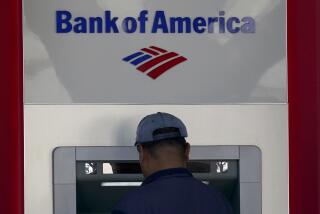BofA defiant over Merrill Lynch bonuses
- Share via
Bank of America Corp. struck an increasingly defiant tone Wednesday against allegations that it misled investors at the height of the financial crisis, making clear to state and federal regulators that it was willing to wage a legal battle to defend itself.
The bank told a federal judge in court filings that it “stands ready to litigate” if he didn’t approve a $33-million settlement with the Securities and Exchange Commission. The company reiterated that it agreed to pay the money only to avoid an extended dispute with one of its regulators.
The filings followed a harshly worded letter to New York Atty. Gen. Andrew M. Cuomo, asserting that his office made “spurious” claims about the bank’s conduct and had its facts “simply wrong.”
The salvos from Bank of America raise the odds that one of the most controversial chapters of the financial crisis will lead to a protracted court battle in which some of Wall Street’s and Washington’s biggest names testify.
The dispute involves competing claims over whether Bank of America hid from shareholders important details about its plans for Merrill Lynch & Co., the troubled Wall Street giant the bank agreed to acquire last fall in a hastily arranged deal aimed at avoiding a repeat of the collapse of Lehman Bros. Holdings Inc.
The SEC claims that Bank of America improperly failed to tell shareholders about plans to pay billions of dollars in bonuses to Merrill Lynch employees. Cuomo’s broader inquiry also is looking into whether BofA concealed losses at Merrill before shareholders voted to approve the deal.
Bank of America has maintained that it did nothing wrong. Any court trial could involve testimony from BofA Chief Executive Kenneth D. Lewis and former Merrill Lynch CEO John A. Thain.
Current and former federal officials could face increased pressure to come before the court, including Federal Reserve Chairman Ben S. Bernanke and former Treasury Secretary Henry M. Paulson, who were actively involved in seeing that the acquisition was completed. Some lawmakers have suggested that the Fed and the Treasury were too involved in the transaction.
Bank of America was joined by the SEC in trying to persuade U.S. District Judge Jed S. Rakoff of New York to approve the settlement.
Rakoff has expressed serious doubts about the settlement and demanded to know why the executives at Bank of America and Merrill Lynch who made the decisions about disclosures weren’t charged as well.
The SEC says evidence showed that the executives relied on their outside lawyers and that they didn’t conspire to lie to investors.
Rakoff has not indicated when he will rule.
Bank of America’s letter to Cuomo was in response to one his office sent to the bank earlier this week. That letter cited four failures to disclose information to shareholders, strongly suggesting that Cuomo was contemplating filing securities charges against Bank of America or its executives.
More to Read
Inside the business of entertainment
The Wide Shot brings you news, analysis and insights on everything from streaming wars to production — and what it all means for the future.
You may occasionally receive promotional content from the Los Angeles Times.










